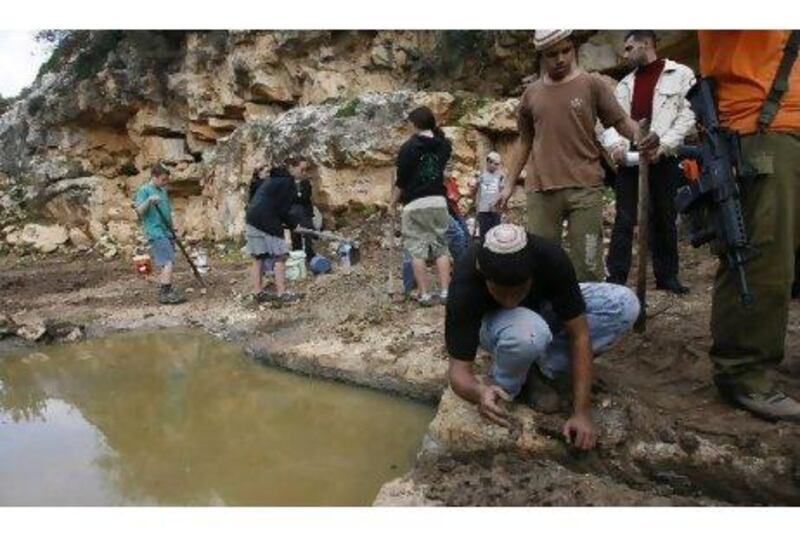TEL AVIV // Jewish settlers in the West Bank are increasingly using threats, intimidation or violence to block Palestinians from using the Israeli-occupied territory's vital natural springs, a United Nations report said yesterday.
Settlers have taken over 30 springs and are trying to take control of another 26 - most of which are located on land privately owned by Palestinians, the UN's Office for Coordination of Humanitarian Affairs said.
The takeover appears to reflect Israel's efforts to exert more control over the West Bank, territory that the Palestinians want for their future state, the document said.
"Similarly to other Palestinian resources and properties seized by Israeli settlers, the water springs are being exploited to further the economic and political interests of settlers," said the report, based on surveys taken last year.
Israel has faced escalating international condemnation for its approach to the allocation of water in the West Bank, with the French parliament's foreign affairs committee in January accusing Israel of implementing "apartheid policies" on the issue.
Ghassan Khatib, a spokesman for the Palestinian Authority, said the report was further evidence of increasing claims by Palestinian farmers and civilians about their obstacles in accessing water.
"Independent organisations like OCHA are saying what Palestinians have been shouting and not been taken seriously by the international community," he said. "The Israeli government is the address that should be held responsible for tolerating and encouraging settlers' violations."
The settlers' bid to take over springs is hurting Palestinian farmers' livelihoods, the report said. The springs represent the single largest source of water for irrigation in the West Bank and a major source of water for livestock. Without access, some farmers either stop cultivating their land or pay to obtain water through pipes or by tanker lorries..
The springs are also used for domestic needs by some Palestinian families who do not have running water, or whose access to water is unreliable.
The report said that settlers used "acts of intimidation, threats and violence" to deter Palestinians from accessing 22 of the springs.
In the case of eight other springs, settlers either erected an electronic fence or took control after Israel declared the area of the springs a closed military zone. This was done without notifying the Palestinian landowners or arranging for farmers to be able to enter the area to work, the document said.
Jamil Darawsheh, a Palestinian farmer from Awarta, south-east of the West Bank city of Nablus, was cited by the UN agency as saying he had lost an estimated 10,000 Israeli shekels (Dh9,770) after he was unable to irrigate new olive seedlings. He said members of the hardline settlement of Itamar have harassed neighbouring Palestinian villagers since the second Palestinian Intifada started in 2000, including threatening them and forcing them to leave their fields.
A 31-year-old farmer, who spoke to the UN agency on condition of anonymity, said he and a friend were gathering wood near a spring on land belonging to his relative when they were threatened by more than three dozen settlers. The group then forced the farmer and his friend to sit by the spring until they were fetched by army vehicles that drove them to a police station for interrogation.
"While some farmers … still use the spring to irrigate their crops, many other farmers have avoided coming to this spring as much as possible due to fear from incidents like this," the report said.
According to the report, the settlers were trying to take over access to some springs by illegally making them into tourist attractions, adding picnic tables, benches and rubbish bins, paving a car park and roads leading to the water and putting up signs with the Hebrew name of the spring.
While some of the Hebrew names are similar to their Arab translations, other springs are named after individuals such as settlement founders, Jewish victims of Palestinian attacks or Israeli soldiers killed in combat, the report added.
The efforts to boost tourism in the area add to the "normalisation" of settlements in the eyes of Israelis, the report added.
The UN officials carried out the survey last year by interviewing Palestinian farmers, reviewing land ownership maps, speaking with Israeli settlers at springs during field visits and examining Israeli websites advertising tourism destinations in the West Bank.





